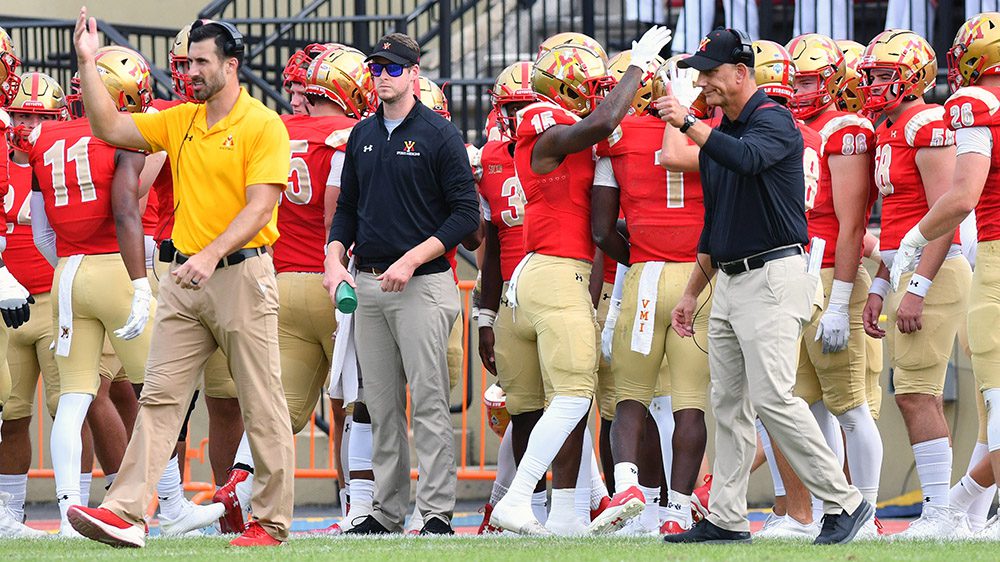Sustaining Excellence: Coaches Compensation Fund

NCAA Football Championship Subdivision: Keydets hold off Terriers, 31-23.—Photo by Chuck Steenburgh ’86.

NCAA Football Championship Subdivision: Keydets hold off Terriers, 31-23.—Photo by Chuck Steenburgh ’86.
Today, no discussion about sports lasts long without the introduction of analytics. Every sport—baseball, football, basketball, soccer, and even golf—has its ever-expanding set of statistics and measurements, many of which are downright esoteric. Rankings abound, too, and each is founded on—yes—more statistics. If you want another set of bewildering numbers to enter the conversation, mention gambling.
It is often hard to devote the time to learn what they mean and see if the claims made based on them have any validity. This is not to say that all these numbers and rankings are useless. Some indeed tell an interesting tale or, at least, bring attention to one. One such ranking concerns VMI football. This year, in terms of the compensation of the football team’s assistant coaches, VMI ranks fourth in the Southern Conference, up from ninth just a couple of years ago. That relatively simple change in a ranking has behind it an interesting story of generosity, leadership, and success.
A few years ago, VMI thoroughly examined its intercollegiate sports program with an eye toward improving it across the board. The task seemed daunting because in many categories, when ranked against other teams in the Southern Conference, VMI ranked last.
One of these categories was the compensation of coaches. Stephen E. Hupp Sr. ’84, former VMI Foundation president, remembers what brought home to him the effect this ranking had in real terms. “After the 2019 season, when VMI football had posted a 5-7 record, Scott Wachenhiem, our head coach, told a meeting that he had had 36 assistant coaches in six years—and that he had never fired any of them. In other words, they all had gone on to better opportunities.” Hupp also recalls being told that this problem was not confined to football but common to every team.
According to Hupp, alumni are “leaders and problem solvers.” He realized that while VMI could offer alumni a solution as to how to increase the scholarship support for cadet-athletes—for example, give to the Keydet Club Scholarship Fund or endow a scholarship for, say, lacrosse—it could not offer them a solution to the compensation problem. So, Hupp came up with a solution.
“I suggested the VMI Foundation create two endowments, one devoted to football and another devoted for any team,” he recalled. “The Foundation leadership and the Keydet Club agreed.”
Asked why a separate fund for football was necessary, he replied, “A lot goes into building and maintaining a winning program in any sport, but none are as demanding as football. It requires facilities, equipment, and personnel—both on the field and on the sidelines—on a relatively large scale.” The football team’s rising fortunes were another factor. “The coaches were an extremely important element to the team’s improvement and that made it imperative to keep them at VMI.”
In the first six months after the endowment was established, alumni came forward with $50,000 in additional gifts. “Admittedly,” said Andrew C. Deal ’12, Keydet Club chief operating officer, “that was not a lot, but the interest definitely was there among alumni and friends.”
It is often said success begets success, and so it was with this endowment. This past spring, VMI football began its pandemic-delayed 2020 campaign. It was a thrilling time in which the team displayed VMI’s “never say die” spirit and, as it chalked up several victories, rose steadily in national polls. The season was capped magnificently when VMI won the Southern Conference’s football championship outright for the first time since 1974.
Not long after the season, many in the VMI family started asking how they could help the team sustain its success. And the VMI Alumni Agencies had the answer. “Many people can take a share of the credit for the championship,” said Hupp. “Undeniably, however, the driving force was Scott Wachenhiem and his assistant coaches. Coach Wach provided the vision and strategy, and his assistants put it into action in practice and in competition.” The key to future success, as Deal puts it, was “keeping this winning team together, and the key to that was increasing the compensation to the assistant coaches.”
“VMI has long had a great reputation for harnessing the loyalty, energy, and enthusiasm of its alumni when it comes to fundraising. The current success of the coaches’ compensation fund attests to that. But this success needs to be replicated throughout the sports program.”
Jim Miller, Interim Athletic Director
As the interest in the fund increased, an alumnus offered a challenge match. “Alumni are known for responding to challenges, and now we could give them one: Their donations would be matched dollar for dollar.” The team’s success and the challenge grant served “to move the needle significantly,” as Deal explains, and by late November 2021, almost $2 million had been given or pledged to the fund.
According to Wachenhiem, the fund’s initial effect was threefold. “First, it helped reward these hard-working, dedicated assistants for winning the Southern Conference championship by providing them a pay increase above and beyond what the usual funding sources would allow.”
Second, it allowed an assistant coach to move from parttime to fulltime, giving VMI a total of 10 full-time coaches. That brought VMI up to the same level as other Southern Conference teams.
Finally, it stabilized the staff, from which the program derives many benefits. “Football is no different than any business,” Wachenheim stated. “People who know each other and have worked together create a more effective, more efficient organization.”
One benefit is in recruiting, said Wachenhiem. “Recruiting is relationship driven, and it takes time. If a coach who has been cultivating a player leaves the team for which he is recruiting, that young man might hesitate to maintain a relationship with that team.”
Another is in terms of player development. “Our job is to help the young men on this team to develop as leaders, as mentors, and as players. If a staff stays the same, the more the systems stay the same. That allows us to increase every player’s performance level. First, we teach the basics—how to do something, be it be an offensive lineman, a running back, or a punter. That establishes a baseline. Then, we teach them what to do in different situations. That improves their performance. The next step is to teach them why we do it the way we do. That gives them a fuller understanding of the game and their roles in it, and that allows them to realize their maximum performance.”
There also is an intangible effect, said Wachenhiem. “I thank Steve Hupp for getting this started and all those who have given it such a good start. It has been meaningful to our entire staff and me to know that alumni think highly enough of us to reward our efforts. Rewarding people motivates them to work harder, and all of us are.”
Jim Miller, VMI’s interim athletic director, praised those who had helped develop the fund and have given to it. “I deeply appreciate the alumni who got behind this effort because it helps Coach Wachenhiem reward and retain the coaches who transformed VMI football into a successful program that is getting widespread attention and bringing great credit to the Institute as a whole and attracting new coaches to the program in the future.”
It also, Miller says, helps the Institute meet one of its top athletic challenges. “If we want to increase the competitiveness of our teams and boost their chances to compete for championships, we need to substantially increase their operating budgets. As a public college, VMI doesn’t have the freedom to allocate money as it sees fit. Its relatively small student population means it doesn’t have the revenues that larger public and private institutions can count on. The only way it can do so, therefore, is through the generosity of its alumni and friends.
“VMI has long had a great reputation for harnessing the loyalty, energy, and enthusiasm of its alumni when it comes to fundraising. The current success of the coaches’ compensation fund attests to that. But this success needs to be replicated throughout the sports program.”
Hupp agrees with this sentiment. “There is no one who wants to see our teams win more than me. I want all of them to be competing for and winning conference championships. And we can get there if the VMI family gets behind our coaches, staff, and cadet-athletes.
“The framework is there, and it works. So, if anyone is keen on accelerating the progress of any of our teams, do what VMI alumni are trained to do: Lead.”

The communications officer supports the strategy for all communications, including web content, public relations messages and collateral pieces in order to articulate and promote the mission of the VMI Alumni Agencies and promote philanthropy among varied constituencies.